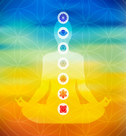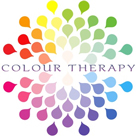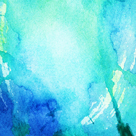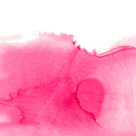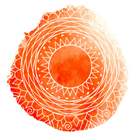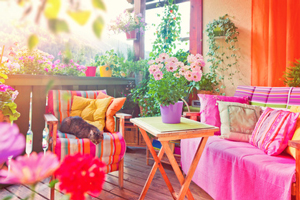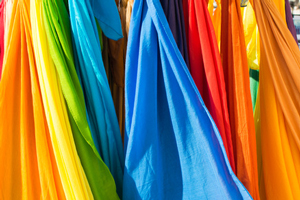|
Colour therapy is a gentle non-invasive
complementary health therapy that harnesses the power of colour to
bring about physical, mental as well as emotional wellbeing. There
are many branches of Colour Therapy that include colour psychology,
art therapy,
light therapy,
as well as at times, different ancient esoteric healing techniques
such as
meditation
and
visualization.
Some of the areas in which colour therapy can
be applied:
- Diet:
we should include a mixture and variety of
colours in our diet and food. Thus the so called "raimbow diet" is
rich in colorful fruits and vegetables, small amounts of meat, low
amounts of dairies and refined sugar, plenty of fish, fresh products
and vitamin D levels: outdoors and sunshine lifestyle.
-
Home and
Interiors:
The colours we surrounds
ourselves with at home can have a strong impact on our moods, energy
levels and overall well being. Choose warm tones for areas where you
want to entertain and socialize - such as the kitchen and living room
-
choose instead calming cooler hues such as blue and turquoise for
areas where you'd like to relax and wind down.
-
Clothes and
accessories:
Our wardrobe should
include a mixture of hues, but most people, unfortunately, tend to stick
to safe colours such as black, navy blue, gray or brown. Be
bold and include colours such as red, pink, orange and purple among
your accessories and outfits!
-
Colour Psycology:
Colour has the power to effect our emotions as
well as tap into the subconscious mind. Psychologists and marketing experts
understand this very well and are interested in studying how colour can be used to heal as well
how it can effect us. For
instance, green has a calming and relaxed feel to it, is known to
help reduce stress and can be used in helping reduce high blood
pressure. Green is often the colour preference of those working
in health and nature, and in business and marketing, it is often the colour choice for promoting
products related to wellbeing and the outdoors.
Artists often understand the psychological
properties of colour and can use them in their work to better
communicate their message or to have an immediate emotional and
psychological impact on their viewers. For instance, Pablo Picasso
and Van Gogh, among others, are artists who knew how to use colour
particularly well. For instance, through the use of soft blue tones Picasso, when
living among the poor and outcasts of Paris, was able to express
their anxieties, sadness and desperation creating a body of work
that came to be known as his "blue period."
Van Gogh, through his use of complementary
colours such as red and green, yellow and purple, or orange and
blue, was able to capture the attention of the viewer creating at
time clashing as well as harmonious combinations.
Most of us may also be familiar with every day language such as "I am feeling blue," or "I have the blues," or "I
see red" or "I am green with envy!"
Hues, thus, are constantly colouring our world,
emotions as well as language!
-
Art Therapy:
Art therapy is not about diagnosing or
analysing a person's art work, nor is it about its aesthetic
qualities, but rather, it is a vehicle that allows a person to
express his/her emotion thorough a different, often more spontaneous
and direct form of communication. It's about bringing to the
surface emotions and feelings that often cannot easily be expressed
through words and language, allowing to find peace and empowerment
though creative expression; colour and images are in fact powerful
tools that can reach beyond words and tap into the sub-conscious
mind, the part of the psyche which is free from the constrain of
family, culture and society. It allows people to get in touch with
different aspects of themselves, and, on a transpersonal level, reach beyond our personality and ego awareness.
*Under
particular and needed circumstances, I am also happy to provide a
session of colour therapy free of charge.
1 Hour Art Therapy Session for Creativity and
Relaxation: 40Fr
In my experience teaching art, I have found
that one of the biggest challenges and problems when it comes to
being creative and producing artwork, especially for adults, is
self-doubt and perfectionism, which really are two sided of the same
coin: the one fuels the other. Perfectionism can be so limiting that
often verge towards unrealistic standards, procrastination, bad
moods and rigid non spontaneous outcomes.
Thus, what inhibits creativity the most
is not lack of talent, but feeling of anxiety, self- doubt and
perfectionism.
Enjoy a session of unrestrained
creativity. Allow for shapes and colours to arise and accept them. There is no right or wrong, no mistakes, no good or
bad art, and most importantly, no judgment!
This session will help you to let go of
your inhibition and fears and create a piece of artwork that is
spontaneous and fresh.
Session
includes:
Art
therapy
Visualization with art therapy
Colour reading and counseling (advise on colours for dress, decor diet and career/business)
1 Hour Art Therapy for
Self-Empowerment: 40 Fr
Sometimes life can leave us drained,
perhaps the pressure to perform both at home or work, and try to fit
in into society's idealized version of who we should be, and what
our life should be like, may affect our self-esteem and our capacity
to see the beauty of our uniqueness, including all the quirkiness
and imperfections.
In this art therapy session we will work on
acceptance and transformation. We will work on keeping an open ended
view of the self, see its malleability, and work on its potential.
Session includes
Art therapy
Visualization with art therapy
Colour reading and counseling (advise on colours for dress, decor diet and career/business)
*Colour/Art therapy
sessions are individual and need to be booked in advance*
Jacqueline is
a fully qualified Holistic Colour Therapy Counsellor
Practitioner.
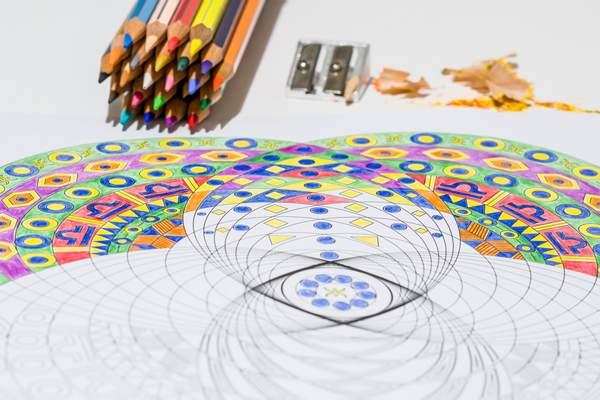
Disclaimer:
Colour therapy is a gentle non invasive Complementary Health
Therapy, by complementary it is meant that it can be practiced
alongside traditional healing methods but never as an alternative or
substitute. Colour therapy does not claim to cure or heal, or
diagnose an illness, but can be beneficial in helping soothe and
alleviate symptoms, as well as provide some useful coping
techniques.
|


